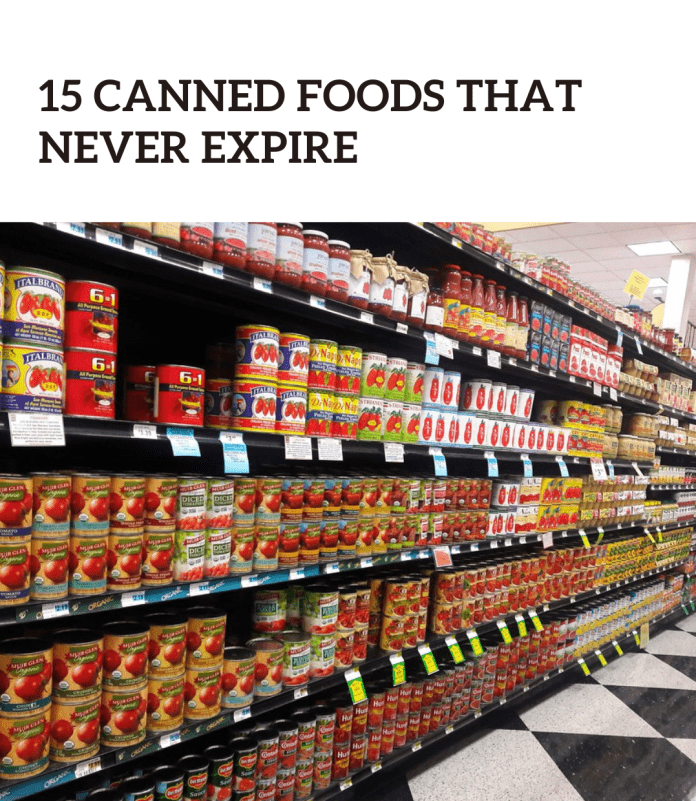In a world where certainty is a luxury, having a stash of enduring food items like canned goods offers both convenience and peace of mind. Celebrated for their long shelf life, affordability, and ease of storage, canned foods are quintessential staples for any pantry. While many carry a ‘best by’ date, certain canned goods can theoretically last forever if stored under ideal conditions, making them excellent for both emergency supplies and routine culinary use.
Decoding Expiration Dates on Canned Goods
The expiration dates on canned foods often mislead consumers into thinking the food will spoil past that date. However, these dates merely indicate peak quality. The canning process, which eradicates harmful microbes, allows these foods to remain stable and safe to eat for many years, provided they are kept in a cool, dry place away from sunlight.
Why Do Some Canned Foods Last Indefinitely?
The longevity of certain canned foods can be attributed to their inherent properties, such as low moisture levels, high concentrations of salt or sugar, and lack of fats and oils that could degrade. While taste and texture may evolve over time, these foods remain safe for consumption.
Key Factors Enhancing Canned Food Durability
- Airtight Sealing: Keeps out air and moisture, staving off spoilage.
- Sterilization: High heat during canning kills off potential spoilage agents like bacteria and mold.
- Preservative Elements: Ingredients such as salt, sugar, or natural acids help maintain the food’s integrity over time.
Optimal Storage Practices for Canned Goods
For maximum shelf life, store your canned items in a stable, cool, and dry environment. Ensure cans remain undamaged and routinely check for any signs of wear such as rust, dents, or swelling — all of which can compromise the safety of the contents.
15 Indestructible Canned Foods
Here’s a list of 15 canned foods known for their indefinite shelf life when properly stored:
- Canned Beans: A protein-rich staple, free from perishable meat or dairy, making it ideal for long-term storage.
- Canned Corn: Preserves its nutrients and flavor, offering a reliable source of fiber and vitamins.
- Canned Carrots: Their high water content and absence of fats help them last endlessly.
- Canned Peas: Provide green vegetables’ benefits for decades, thanks to their stable preservation.
- Canned Tomatoes: Their natural acidity prevents bacterial growth, ensuring longevity.
- Canned Pumpkin: A versatile base for many recipes, loaded with essential nutrients and capable of enduring storage.
- Canned Fish: Items like tuna and sardines are excellent protein sources, preserved impeccably in cans.
- Canned Chicken: Offers convenience and longevity as a precooked protein source.
- Canned Beef: Similar to canned chicken in terms of its long shelf life and versatility.
- Canned Chili: Its ingredients promote preservation, making it a hearty, long-lasting meal option.
- Canned Coconut Milk: Although not as enduring as other canned goods, it remains viable for years under the right conditions.
- Canned Soups: Especially those with high salt content, can be safely stored indefinitely.
- Canned Stews: These mixtures of meats and vegetables are perfect for extended storage.
- Canned Fruit: Fruits in syrup or juice maintain their flavor and nutritional value over time.
- Canned Spaghetti Sauces: High acidity content like that in tomato-based sauces aids in long-term preservation.
Health Pros and Possible Cons of Canned Foods
Canned goods retain most of their nutrients, providing essential vitamins and minerals when fresh produce is unavailable. However, it’s wise to opt for versions with reduced sodium or no added salt to balance your diet.
Risks Linked to Outdated Canned Foods
Even with their robust shelf life, it’s crucial to discard cans that show signs of spoilage, such as bulging, leaking, rusting, or containing food with off smells or colors, as these are indications of potential contamination.
Conclusion: Maximizing Your Canned Food Benefits
The ability to stockpile foods that virtually never expire offers a reliable way to ensure you always have access to nutritious meals. By understanding which items last and how to store them, you can maintain a well-prepared pantry suited for any situation, from everyday meal prep to emergency readiness.


